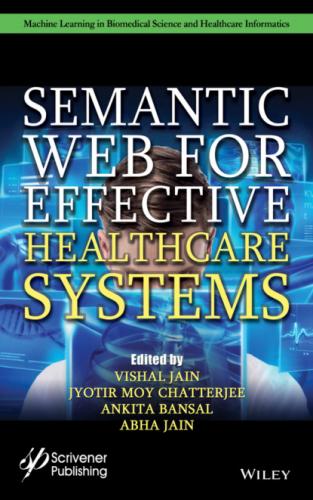5 Preface
7 Index
List of Illustrations
1 Chapter 1Figure 1.1 Decision-making process from social media reviews.Figure 1.2 User-generated content analysis (UCA) model.Figure 1.3 Term weighing schemes for feature extraction.Figure 1.4 Synonymy and polysemy issues in English.Figure 1.5 Approximated TD matrix by SVD.Figure 1.6 LDA framework.Figure 1.7 Plate notation of CFSLDA model.Figure 1.8 Ontology-based semantic indexing (OnSI) model.Figure 1.9 Domain ontology modeling for features.Figure 1.10 Ontology mapping using OnSI model.Figure 1.11 Spring view of domain ontology (DS1).Figure 1.12 Precision vs recall curve for the Dataset DS1.Figure 1.13 Hierarchy of MCDM problem.Figure 1.14 Ranking of features by VIKOR method.
2 Chapter 2Figure 2.1 Sources of data in healthcare. Wikipedia contributors. (2021, May 11)...Figure 2.2 Conceptual architecture of big data.
3 Chapter 3Figure 3.1 Conceptual diagram for patient’s monitoring system.Figure 3.2 Ontology for patient’s monitoring system.Figure 3.3 Parse tree for patient’s monitoring system.Figure 3.4 SWRL for patient’s monitoring system.Figure 3.5 SPQRAL query for patient’s monitoring system.Figure 3.6 Comparison between SQL and SAPRQL.
4 Chapter 5Figure 5.1 (a) Sequential composition model; (b) Parallel composition model.Figure 5.2 Evolution of actionable content.Figure 5.3 Data to actionable content triangle.Figure 5.4 Spectrum of healthcare analytics.Figure 5.5 Model of ontology.Figure 5.6 Different types of ontologies.Figure 5.7 Block diagram for actionable content discovery.Figure 5.8 Overall architecture of ontology-driven actionable content discovery ...Figure 5.9 Inner mechanism of proposed architecture.Figure 5.10 Contextual dimension modeling diagram with data coming from various ...
5 Chapter 6Figure 6.1 Architecture diagram.Figure 6.2 Parse tree of medicine.Figure 6.3 Medicine ontology.Figure 6.4 Rules of construction.Figure 6.5 SPARQL query output.
6 Chapter 7Figure 7.1 The above figure represents a graph-based representation of meta-anal...Figure 7.2 The above figure represents a graph-based representation of meta-anal...Figure 7.3 The intraoperative results of the robotic-assisted mitral valve surge...Figure 7.4 The encounters of complications faced during the surgery by both grou...Figure 7.5 The postoperative results depict that the patients in Group II requir...
7 Chapter 8Figure 8.1 Phases of IoT process.Figure 8.2 IoT-based healthcare architecture.Figure 8.3 Semantic web-based IoT healthcare.
8 Chapter 9Figure 9.1 Examples of some ontologies.
9 Chapter 10Figure 10.1 CAP. Consistency and tolerance to network partition or availability ...Figure 10.2 Stages in the proposed model.
10 Chapter 11Figure 11.1 Disorders of tyrosinemia type II.Figure 11.2 UMLS metathesaurus relations.
11 Chapter 14Graph 14.1 Increase in life expectancy with the advancement in healthcare sector...Figure 14.1 Distribution of COVID cases across the world.Figure 14.2 Projections of the healthcare facilities present VS that we require.Figure 14.3 Three-stage model for critical care patients.
List of Tables
1 Chapter 1Table 1.1 Confusion matrix.Table 1.2 Social media reviews for healthcare service (DS1).Table 1.3 Number of reviews of features and hospitals (DS1).Table 1.4 List of top five terms by LDA model.Table 1.5 Sample correlated terms selected by CFSLDA.Table 1.6 List of correlated feature terms selected by CFSLDA model.Table 1.7 Performance evaluation.
2 Chapter 2Table 2.1 Growth of data [15].
3 Chapter 4Table 4.1 List of popular biomedical ontologies.Table 4.2 List of popular biomedical libraries.
4 Chapter 7Table 7.1 The table shows counts of complications that were encountered intra- a...
5 Chapter 9Table 9.1 Different terms used in computational examination [13].Table 9.2 Examples for interoperability standards and ontologies commonly used i...Table 9.3 Resources and applications in human phenotype ontology contexts.
6 Chapter 10Table 10.1 Contingency matrix of positives and negatives.
7 Chapter 11Table 11.1 Patients characteristics in the final dataset (n = 829).Table 11.2 ADL disabilities patients before and after cancer diagnosis.Table 11.3 Q (R, w*), rule for ADL.
8 Chapter 12Table 12.1 List of various diagnostic tools with their webpages [6].
9 Chapter 14Table 14.1 Three-stage model of application of AI for patients in critical care.
Pages
1 v
2 ii
3 iii
4 iv
5 xv
6 xvi
7 xvii
8 xviii
9 xix
